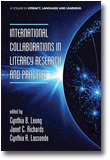
International Collaborations in Literacy Research and Practice
Edited by:
Cynthia B. Leung, University of South Florida St. Petersburg
Janet C. Richards, University of South Florida
Cynthia A. Lassonde, SUNY College at Oneonta
A volume in the series: Literacy, Language and Learning. Editor(s): Claudia Finkbeiner, Universitaet Kassel. Wen Ma, Le Moyne College.
Published 2014
Literacy researchers and educators are currently involved in exciting international literacy projects. However, many in the field are not aware of these initiatives. In compiling this edited volume, our intent is to provide a resource book for university instructors and research faculty with examples of international literacy projects and what was learned from the projects. Chapter contributors offer stories of real people who collaborate across nations to exchange ideas, promote literacy development, and increase global understandings. The literacy initiatives presented in this book show how literacy colleagues have provided opportunities for students and educators of different countries to communicate in meaningful ways. Through international literacy projects and research, participants work to forge relationships based on mutual respect, despite their differing cultures and languages. They see their work as based on the mutual connectedness to the human community.
CONTENTS
Introduction, Alan E. Farstrup. Framing Collaborative Efforts for Literacy, Cynthia B. Leung, Janet C. Richards, and Cynthia A. Lassonde. PART I: LITERATURE AS A LENS FOR UNDERSTANDING OTHER CULTURES. Ethiopia for Teachers: A Collaborative Celebration of Culture and Literacy, Laurie J. Curtis. United Arab Emirate and U.S. Preservice Teachers Share Perspectives in Online Literature Circle Discussions, Patience A. Sowa and Cynthia M. Schmidt. Reading Across Continents: Creating Adolescent Literacy Leaders in Washington, D.C., Abuja, Nigeria, and Accra, Ghana, Elizabeth V. Primas and Liane Rosenblatt. An Exploratory Inquiry of Wordless Picture Book Oral Compositions across Cultures, Carole Janisch, Xiaoming Liu, Amma Akrofi, and Mary Napoli. PART II: TEACHING AND RESEARCHING READING AND WRITING IN INTERNATIONAL SETTINGS. Getting Past Didactic Instruction: Understanding the Literacy Curriculum for Students with Developmental Disabilities in Tanzania, Angela Stone-MacDonald. Chinese Adolescents and U.S. Teachers Meet in a Digital Story Writing Workshop, Marylou M. Matoush, Danling Fu, and C. William “Sandy” Miller. Preparing U.S. Preservice Teachers for Literacy Instruction through Student Teaching in New Zealand, Julie Winneur Ankrum and Allan Nail. Increasing U.S. Inservice Teachers’ Cultural Awareness through Summer Teaching in China, Cheryl M. North and Nancy Rankie Shelton. PART III: COLLABORATING FOR SCHOOL-WIDE LITERACY INITIATIVES AND PROFESSIONAL DEVELOPMENT. Promoting Reading Achievement in Malawian Primary Schools: An International Collaboration, Misty Sailors, Henri Chilora, Davie Kaambankadzanja, and James V. Hoffman. The Guatemalan Literacy Project: Collaboration Among Literacy Educators, Mayra C. Daniel, Marcia Mondschein, and Lucrecia de Palomo. You Are One of Us: Forging the Development of Dialogic Communities of Practice in the Bahamas, Gertrude Tinker Sachs. Improving Elementary School Literacy in Mauritius Through Project ZEP, William L. Edwards, Janet Condy, and Sakil Malik. PART IV: COLLABORATING FOR CRITICAL THINKING THROUGH PROFESSIONAL
DEVELOPMENT. The Reading and Writing for Critical Thinking (RWCT) Project: Working in the Thai Jungle with Indigenous Myanmar (Burmese) Teachers, Janet C. Richards. Active Learning and Critical Thinking: A Higher Education Professional Development Program in Croatia, Sharon B. Kletzien, Vlasta Vizek Vidović, and Višnja Grozdanić.
-
Paperback9781623965655
Web price: $45.04 (Reg. 52.99)
-
Hardcover9781623965662
Web price: $80.74 (Reg. 94.99)
- eBook9781623965679

- LAN010000 - LANGUAGE ARTS & DISCIPLINES: Literacy
- EDU029040 - EDUCATION: TEACHING METHODS & MATERIALS: Social Science
- EDU040000 - EDUCATION: Philosophy & Social Aspects
-
 Authentic Voices
Culturally Responsive Teaching and Learning
Authentic Voices
Culturally Responsive Teaching and Learning
-
 Collaborative Learning in a Global World
Collaborative Learning in a Global World
-
 Educational Practices in China, Korea, and the United States
Reflections from a Study Abroad Experience
Educational Practices in China, Korea, and the United States
Reflections from a Study Abroad Experience
-
 Innovative Approaches to Teaching Multilingual Students
Innovative Approaches to Teaching Multilingual Students
-
 Listening to the Voices of Boys
Exploring the Motivation of Primary Boys to Engage in Reading
Listening to the Voices of Boys
Exploring the Motivation of Primary Boys to Engage in Reading
-
 Reconceptualizing Literacy in the New Age of Multiculturalism and Pluralism
2nd Edition
Reconceptualizing Literacy in the New Age of Multiculturalism and Pluralism
2nd Edition
-
 Views from Inside
Languages, Cultures, and Schooling for K‐12 Educators
Views from Inside
Languages, Cultures, and Schooling for K‐12 Educators

